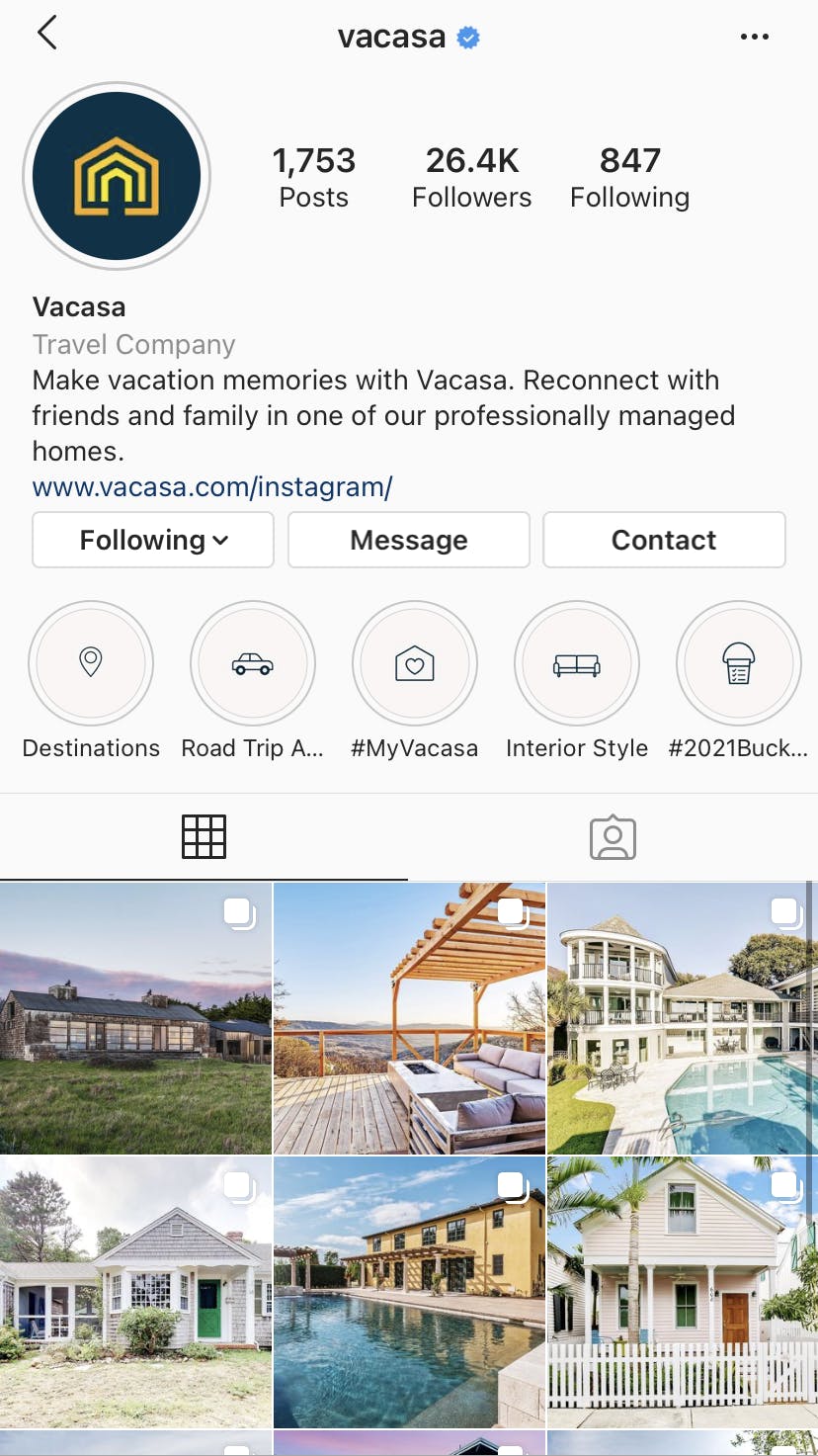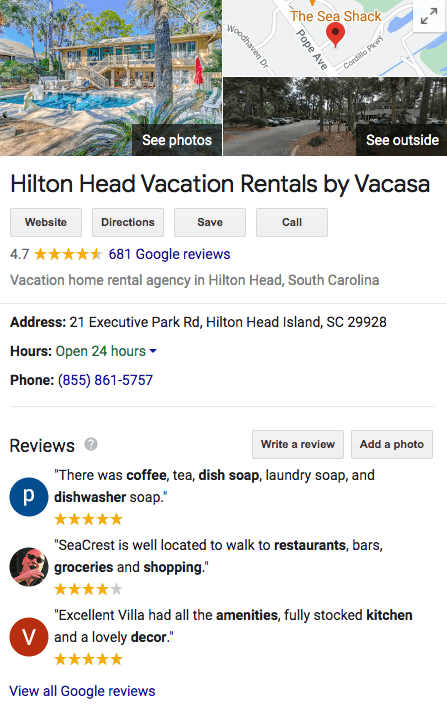Every stay starts with a search.
And, if you nail the basics of search engine optimization (SEO), the search is where guests will find you and your vacation home.
SEO consists of organic (meaning unpaid) search strategies that naturally draw traffic to your website by improving your rankings on the search engine results pages (SERP). Landing on the first page of the SERP is vital to your success as a vacation home owner. After all, a majority of travelers search online for every facet of their vacations—including flights, things to do, and, of course, where to stay. The higher your home ranks in the SERP, the more views you are likelier to get.
However, there’s a lot to unpack when understanding SEO. So, we turned to Vacasa’s SEO Team Lead Nicole Jolma, who implements complicated SEO strategies so effortlessly that we often suspect her of conspiring with Google behind the scenes. Here, she breaks down the basics of boosting your organic visibility when travelers start Googling.
If you’ve set up your own vacation rental website, keywords are one of the most straightforward ways to impact your vacation home’s ranking in the SERPs. Search engines like Google scan websites for these keywords and showcase sites they’ve deemed most authoritative and relevant (among many other factors) to a guest’s query. Nicole suggests using tools like SEMRush or Google Keyword Planner to research what keywords guests are using, and how often they are using them, when looking for vacation rentals in your specific area.
Don’t assume what search terms people use. According to Nicole, there are many variations of vacation rental-related keywords. And, a lot depends on where your home is located.
For instance, when traveling to the Smoky Mountains or Big Bear, people typically search for “cabin”-related keywords, she says. Meanwhile, visitors to Panama City Beach typically search “condo.”
Another tip: Highlight your amenities. On Vacasa.ca, Nicole ensures that we are highlighting our homes’ amenities not just in their listing descriptions, but also in all the header tags. Think “Colorado cabins with hot tubs” or “Michigan lake house rentals."
Once you determine a group of relevant keywords, it’s time to place them in specific areas on every page of your website. For Vacasa.ca, here are some key spots where we implement keywords:
Why are these areas vital? Building SEO into every page gives you the chance to rank for several different searches. For instance, you can rank for your “what to do in Kauai” page or a “best places to eat in Aspen” page. According to Nicole, each page should focus on one primary keyword.
Don’t make the mistake of stuffing keywords into your website (or any content, for that matter). Nicole advises to write naturally for the humans reading your site. Google is smart enough that you don’t need exact matches of keywords. So, make them plural or add some connector words if needed to sound more natural.
Your home is a success waiting to happen. We'll show you how.
Google loves fresh content. The best way to continuously add new content to your site is with a blog. Most importantly, keep your target keywords in mind. Take Vacasa’s blog for example. We publish a steady stream of blog posts promoting travel to our regions built around the search terms that travelers are looking for. Are people searching for “easy 14ers in Colorado”? Write a blog post suggesting trails close by. Are there frequent searches for hot springs in your area? Jot down some ideas for your latest post.
Not only do blogs provide the fresh content that boosts your relevance to the search engines, you now have marketing content to promote on your social media channels or through email marketing. And in turn, this will draw more people back to your website. (That’s what we call a win-win-win.)
Nicole offers this pro tip when writing your vacation home blog: Seasons matter in the travel industry. Write one season ahead, since people are likely planning a few months out. For example, cover winter activities in the fall and summer to-dos in the spring.
Your SEO activities shouldn’t only be relegated to your own website, Nicole says. You can also boost your rankings with off-page SEO (any SEO activities you do outside of your website). The more mentions of your vacation home online and the more links that connect back to your website, the greater the likelihood your home will be seen on the first page of the SERP.
Use your keywords strategically in your username and profile, as well as in your social media posts. Platforms like YouTube and Pinterest even rank on the SERP, which boosts your chances of organic exposure. Best of all, organic social media posts are free (just like organic search).
Get a membership with your local convention and visitors bureau, tourism authority, or chamber office. These are considered authoritative websites. Plus, these organizations can highlight your vacation rental in their accommodations section, along with a description (consider your keywords when writing these) and a link to your website. This not only builds link equity, but also increases your chances of being found and booked.
Also known as channels, these are sites like Airbnb and Vrbo. Not only do these sites attract a vast audience of potential guests, but your listings on these sites can also rank in the SERP. If Vacasa were to manage your vacation home, our team of professional writers would custom-craft a description built around your keywords and upload it to all the major channels.
If you have a website that features more than one vacation home and you have a physical business office, you could get a Google My Business listing. This free listing allows you to come up in Google’s interactive map when people search for vacation homes in your area as well as Google’s Business Profile on the SERP. One caveat: Google currently doesn’t allow GMB listings for a standalone vacation home.
SEO certainly has plenty of moving parts. So many that even professional marketers lean on tools to make it all happen. While paid tools can likely deliver more robust results, the myriad of free tools online can be a great starting point. Here are some of Nicole’s favorites:
The simplest and smartest way to consistently implement SEO and improve your vacation home’s SERP rankings? Hire digital marketing professionals who are experts at increasing exposure and revenue for vacation rentals.
For more than a decade, our team at Vacasa has been fine-tuning SEO strategies, and evolving them to keep up with the latest Google algorithm updates (hint: there are a lot to keep track of). The result? Vacasa homes that garner more visibility than their competitors time and time again.
Best of all, a full-service vacation rental company like Vacasa not only executes SEO tactics, they’ll market your home in several other ways to constantly keep you in front of travelers. This includes email marketing, channel marketing, and ad campaigns.
If you decide to embark on SEO for your vacation home on your own, some final guidance: SEO is a marathon, not a sprint, Nicole says. Building trust and authority with Google takes time. In fact, it can take months to see an impact in rankings. Plus, she advises to consider your competition in your destination. A more competitive market means a more competitive SERP, meaning it will be more difficult for your site to rank for searches in popular Panama City Beach versus a small coastal town. So be patient and be persistent to get your vacation home the organic attention it deserves.
Both sites draw in a large number of travelers looking for vacation homes just like yours. Plus, both boost your home’s exposure and your bookings. Needless to say, we are fans of both. They tend to attract different audiences. Airbnb tends to attract millennials, while Vrbo is popular with families. However, their audience sizes are so vast. We suggest listing your vacation home on both sites to reach the biggest number of travelers possible. We’ve broken down the largest vacation rental sites where you can list your home.
The most popular vacation rental sites, such as Booking.com and Vrbo, are technically free to list your property on. Then, you pay a commission for every booking you receive from their site. Even listing your vacation home with a local visitors bureau or chamber of commerce often requires a paid membership.
However, you have no limitations on how much you promote your own home for free. Increase your rankings on the SERP by writing blogs around your keywords. Promote your vacation rental organically on your social media channels. Send out frequent emails offering travel tips to your email subscribers.
Want more tips? Read how to market your vacation rental >
Travelers have more places to find vacation homes than ever before. And, that’s great news for you. The more places you list online, the more likely you are to be discovered, then booked. It’s generally a great idea to start listing on the biggest platforms first, since these sites draw in the largest numbers of people looking for vacation rental options. These large sites include Airbnb, Vrbo, and Booking.com. On Vacasa.ca, we’re constantly deploying several dynamic SEO strategies to boost our homeowners’ visibility on the SERP and outrank their competition. See our breakdown of other big players in the vacation rental industry and why you should list on them.
There are seemingly endless ways to market your vacation home and get it in front of a wide audience. At Vacasa, we like to think creatively, while also leveraging tried and tested marketing strategies. Some tips for DIY vacation home owners:
Watch a short webinar on our approach to marketing vacation homes >
Call 844-518-0967 to speak with a Homeowner Consultant, who can answer preliminary questions and see if we’d be a good fit for you.
If you'd like to move forward, we’ll put you in touch with our market expert in your neighborhood to explore the financial potential of your home, outline our management fee, and introduce your local team.
California licenses
Vacasa Seasonals Inc.
California DRE #02160171
Vacation Palm Springs Real Estate, Inc.
California DRE #01523013
Vacasa offers property management and other real estate services directly through Vacasa LLC and through Vacasa LLC's licensed subsidiaries. Click here for more information about Vacasa's licensed real estate brokerage/property manager in your state. Vacasa’s licensed real estate brokerages/property managers include: Vacasa Alabama LLC; Vacasa Arizona LLC; Vacasa of Arkansas LLC; Vacasa Colorado LLC (Micah Victory); Vacasa Delaware LLC, 302-541-8999; Vacasa Florida LLC; Vacasa Illinois LLC 481.014072, Micah Victory Managing Broker Lic# 471.021837; Vacasa Louisiana LLC, Dana MacCord, Principal Broker, ph 504.252.0155 (Licensed in LA); Vacasa Michigan LLC, 602-330-9934; Vacasa Missouri LLC, Vicki Lyn Brown, Designated Broker; Vacasa Nevada LLC; Vacasa New Hampshire LLC,45 NH-25, Meredith, NH 03253, Susan Scanlon, Broker of Record; Vacasa Minnesota, Broker: Micah Victory, license #40877637; Vacasa New Mexico LLC, 503-345-9399; Vacasa New York LLC, 888-433-0068, Susan Scanlon, Real Estate Broker; Vacasa North Carolina LLC; Vacasa Oregon LLC; Vacasa Pennsylvania LLC; Vacation Palm Springs Real Estate, Inc., California DRE #01523013, Mark Graham, California DRE #00700720; Vacasa Real Estate LLC (licensed in Texas, Debra Brock, Designated Broker); Vacasa Real Estate LLC (licensed in Washington, Robert Brush, Designated Broker); Vacasa Seasonals Inc., California DRE #02160171, Lisa Renee Stevens, California DRE #01485234; Vacasa South Carolina LLC; Vacasa South Dakota LLC; Vacasa Tennessee LLC; Vacasa Vacation Rentals of Hawaii LLC, 69-201 Waikoloa Beach Dr. Ste. #2F17, Waikoloa, HI 96738; Vacasa Vacation Rentals of Montana LLC, Terah M. Young, Licensed Property Manager; Vacasa Virginia LLC; Vacasa Wisconsin LLC; Vacasa Wyoming LLC. In Canada, this advertisement is provided by Vacasa Canada ULC, CPBC lic. number 75826, 172 Asher Rd. V1X 3H6 Kelowna, BC.

